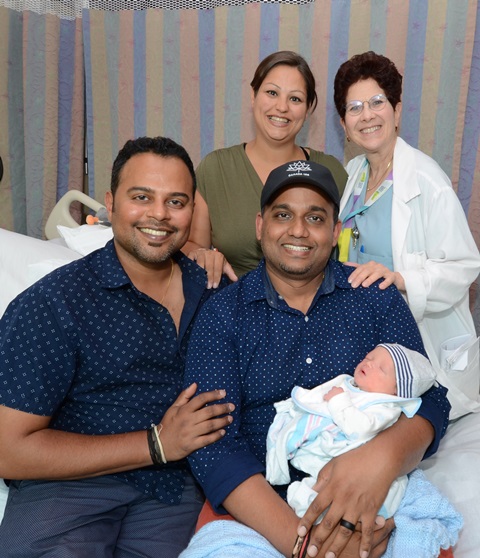
By Erica Di Maio
“How is mom feeling today?”
“I need dad to step outside of the room for the epidural.”
“After birth, you will be moved to the ‘Mother and baby unit’.”
While these gendered terms are used commonly throughout Ontario and Canadian hospitals, Michael Garron Hospital (MGH), Toronto East Health Network is making significant efforts to use gender diverse terms and foster an LGBTQ inclusive environment for all families.
For Asish Purushan and Krishneel Lall, a married male same-sex couple who welcomed baby Sidharth to their family this summer, these efforts have fundamentally shifted their perspective on what it means to experience parenthood in a way they could never have imagined.
Simply put, they have been empowered as key decision makers and players in a process they had expected to be mere spectators in.
Asish, who immigrated to Canada from India, had been living in Toronto’s Cabbage town for more than 10 years. Krishneel, born in Fiji, moved to California, United States, with his mother and sisters; a chance meeting in Toronto would bring Asish and Krishneel together in 2007.
The two connected instantly and bonded over their shared values of one day raising children. When the US introduced the same-sex marriage law in 2013, they married in California and two years later, Asish moved to the east coast to live with Krishneel and begin their surrogacy journey.
After a two-year waiting process, Asish and Krishneel were matched with Toronto surrogate Mazyline McCarthy, wife and mother of three who delivered all of her children at MGH.
“I spoke with several couples, but when I met Asish and Krishneel there was an instant spark,” says Mazyline. “We had similar values and knew where we wanted the journey to take us.”
Next, it was time to find an egg donor.
After an initial setback of finding an egg donor who later determined they were not comfortable donating to a same-sex couple, Asish and Krishneel were able to secure an alternative donor.
After a successful embryo transfer procedure, which is the final step of the in vitro fertilization process, Mazyline became pregnant.
As the baby’s due date quickly approached, Dr. Brenda Woods, obstetrician and gynecologist, advised Asish, Krishneel and Mazyline to set up a meeting with the hospital’s Family Birthing Centre team to prepare for the delivery of the baby.
But when it came time to meet with the hospital, Asish admits he had reservations.
“Living as a gay man and man of colour, I’m always very conscious of how I present myself and how people might perceive me,” he says.
“I had heard experiences where same-sex parents were not given access to the room or child. Having a baby is a milestone that is sometimes minimized for gay couples.”
Dr. Helena Frecker, obstetrician and gynecologist who specializes in LGBTQ and Gender Diverse Care, explains the importance of inclusivity during all hospital interactions and removing any potential barriers to accessing care.
“Many LGBTQ+ patients and community members have experienced discrimination and stigma within the health care system, and this can often lead to avoidance of care. This is especially true for transgender individuals,” says Dr. Frecker.
“Changing the healthcare environment and implementing gender inclusive training and education for all providers is key to creating safe spaces for all of our patients and staff.”
When Asish and Mazyline met with Jennifer Bordin, Manager, Maternal, Newborn & Child Health Services, they were overwhelmed by the level of support from the team. They were educated on the hospital’s surrogacy policy, toured the unit and developed a birthing plan that all parties would be comfortable with during and after the delivery of the baby.
“Jennifer asked us questions about the birthing plan that we hadn’t even thought about because we didn’t realize we would be given these choices during the process,” says Asish.
“We were totally blown away. It was a beautiful experience – so kind, inclusive and thoughtful.”
The Family Birthing Centre formed an LGBTQ Committee earlier this year. The Committee has participated in Toronto Pride, reached out to LGBTQ families for feedback on their care, organized hospital rounds with same-sex couples sharing their experiences, updated the pre-admission questionnaire to use inclusive language and gender-neutral pronouns, and implemented positive space signs on the unit.
MGH has partnered with The 519 since 2015 to provide inclusion training to staff – to date, 400 frontline staff have received training.
Erica Di Maio is Senior Consultant, Corporate Communications at Michael Garron Hospital.

